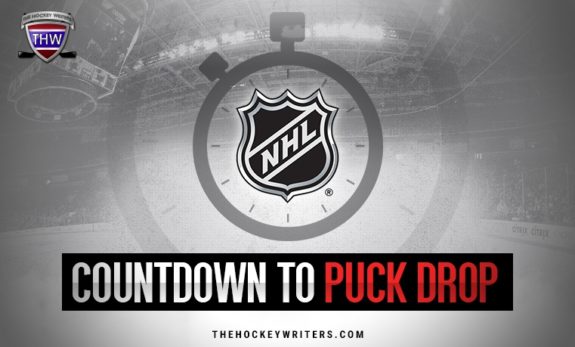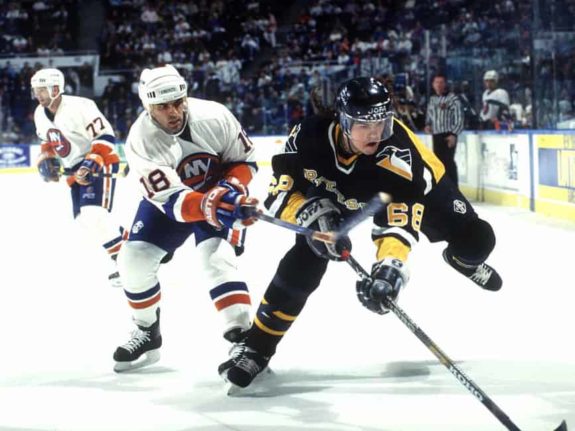Introducing The Hockey Writers’ Countdown to Puck Drop series. From now until the puck drops on the 2019-20 NHL’s regular season on Oct. 2 when the Toronto Maple Leafs host the Ottawa Senators, we’ll be producing content that’s connected to the number of days remaining on that particular day. Some posts may be associated with a player’s number, while others will be connected to a year or length of time. We’re really excited about this series as we take you through the remainder of summer in anticipation of the return of NHL hockey.

After missing the postseason for seven-of-eight seasons from 1983 to 1990, the Pittsburgh Penguins earned the fifth-overall pick in the 1990 NHL Draft. Still looking to build around superstar Mario Lemieux, the team looked to a big-bodied Czech winger, Jaromir Jagr. The teen prospect almost immediately became a rock star in Pittsburgh, flipped the script on the franchise’s history and an ageless legend along the way.
Jagr was born and grew up in former Czechoslovakia. He played in Kladno, and like many other high-end athletes, began playing against teenage competition at just 10 and 11 years old. It helps that he worked on his father’s farm and eventually filled out a 6-foot-3, 230-pound frame. At just 16 years old, he played for Kladno in the country’s top hockey league, scoring 30 goals and 68 points over two seasons before heading to North America.
The 1980s Penguins were horrible — they routinely finished near the bottom of the league in the early part of the decade before slowly becoming a fringe playoff team several seasons later. However, after drafting Jagr to start the 1990s era, the team never missed the postseason with him on the roster. In fact, the Penguins immediately won back-to-back titles in 1991 and 1992.
Jagr didn’t jump straight to the NHL and dominate, though. His rookie campaign was a tale of two halves:
First 34 games: seven goals. 12 points, minus-10 rating
Final 46 games: 20 goals, 45 points, plus-6 rating
His turnaround was sparked by a seven-game point streak in mid-December where he tallied 5 goals and 10 points. Through the regular season, he would post two more point streaks of at least six games. Jagr tallied just 13 points during Pittsburgh’s Stanley Cup run but used the success as a springboard for his career.
The following season, Jagr’s point total jumped to 69, with another 24 in 21 postseason games, on the way to his second Stanley Cup win in as many seasons. Unfortunately, he didn’t reach a third Stanley Cup final appearance until his age-40 campaign with the Boston Bruins. The Penguins reached the Eastern Conference final just twice more during Jagr’s tenure.
Jagr Fills up Trophy Case
Despite not lifting another Stanley Cup, Jagr didn’t stop plastering his name across the record books. He notched a pair of 30-goal, 90-point campaigns before the lockout-shortened 1994-95 campaign. During the lockout, he went back to Kladno of the Czech league and dominated, as expected, scoring 22 points in 11 games. He also made brief stops in Italy and Germany, leading to a very Jagr-like story.
The two-time Stanley Cup winner played for a low-end German team for one game because he was friends with a couple of the current players. Just for fun, he racked up 11 points just for some free food and a bed to sleep in on his way back to the states.
Apparently, it worked. Jagr lit up scoreboards during the 48-game season, totaling 70 points and taking home his first Art Ross Trophy for leading the NHL in scoring. He set career highs of 62 goals and 149 points during the 1995-96 season, though Lemieux would earn two straight Art Ross Trophies during that time. Through his first seven NHL seasons, Jagr racked up 266 goals and 633 points over 504 games before going on a run that few had done before him.

From 1998 to 2001, his final four seasons in Pittsburgh, Jagr led the NHL in scoring each year, joining Gordie Howe, Phil Esposito and Wayne Gretzky as the only players in league history to win the Art Ross in four consecutive seasons. During that span, he also collected his first and only Hart Memorial Trophy for league MVP while earning the Lester Pearson (now known as the Ted Lindsay) Award, given to the league MVP as voted by his peers, twice.
End of an Era With Penguins
During his time with the Penguins, Jagr was an absolute rock star. He was one of the league’s best players, but it was his larger-than-life persona that made him a fan favorite. To this day, few have grown better hockey hair than Jagr’s flowing mullet in the early stages of his career. He was known for driving too fast and never married, living a Playboy lifestyle throughout his entire career.
When things are going well, all of those massive personality traits are fun. However, as the 1990s came to a close, Jagr’s Pittsburgh career was in its twilight stages. The superstar demanded a trade as fans began to question his passion and drive. Jagr was dealt to the Washington Capitals in July 2001 in exchange for Kris Beech, Ross Lupaschuk and Michal Sivek — the three would combine for just 73 points in 239 career NHL games. Looking back, Jagr admits that he never wanted to leave Pittsburgh but thought the franchise was better off without him while facing a tough financial situation.
Life After Pittsburgh
As expected, the Penguins had a massive hole to fill without Jagr and they weren’t able to for several years until drafting Evgeni Malkin and Sidney Crosby. In Jagr’s final season with the team, they won 42 games and scored 281 goals, second-most in the league. Their first year without him? Just 28 wins and 198 goals scored, 23rd in the NHL.
Meanwhile, Jagr spent two-and-a-half seasons with Washington before being traded again, packing his bags for New York to join the Rangers. In his first full season there, he scored 123 points while earning his third and final Pearson award. He never broke the 100-point mark again.
Prior to that 123-point outburst, Jagr went back to Europe during the 2004-05 lockout, spending time once again with his hometown Kladno team and also taking part in some KHL action in Russia with Omsk Avangard. He later took a three-year hiatus from the NHL to suit up with Omsk from 2009-11.
For the rest of his career, Jagr suited up for another six NHL franchises. He scored an impressive 130 points in 181 games with the Florida Panthers as he approached his mid-40s. In his final NHL action, the then-45-year-old struggled through 22 games with the Calgary Flames in 2017, though he’s still playing back home in Kladno.

Jagr’s career never had a dull moment. From being a high-flying, Stanley-Cup-winning teenager to traveling from franchise to franchise and creating new fans as his career came to a close. The Czech start has always been a fan-favorite, but more importantly, he changed the coure of the Penguins’ franchise forever.